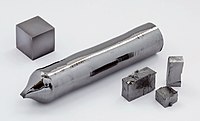
Photo from wikipedia
Lithium (Li) is one of the commonly used target materials for compact accelerator-based neutron source (CANS) to generate neutrons by 7Li(p, n)7 Be reaction. To avoid neutron yield decline caused… Click to show full abstract
Lithium (Li) is one of the commonly used target materials for compact accelerator-based neutron source (CANS) to generate neutrons by 7Li(p, n)7 Be reaction. To avoid neutron yield decline caused by lithium target reacting with the air, a titanium (Ti) coating was deposited on the lithium target by magnetron sputtering technology. The color change processes of coated and bare lithium samples in the air were observed and compared to infer the chemical state of lithium qualitatively. The surface topography, thickness, and element distribution of the coating were characterized by SEM, EDS and XPS. The compositions of samples were inferred by their XRD patterns. It was found that a Ti coating with a thickness of about 200 nanometers could effectively isolate lithium from air and stabilize its chemical state in the atmosphere for at least nine hours. The Monte Carlo simulations were performed to estimate the effects of the Ti coating on the incident protons and the neutron yield. It turned out that these effects could be ignored. This research indicates that depositing a thin, titanium coating on the lithium target is feasible and effective to keep it from compounds’ formation when it is exposed to the air in a short period. Such a target can be installed and replaced on an accelerator beam line in the air directly.
Journal Title: Materials
Year Published: 2021
Link to full text (if available)
Share on Social Media: Sign Up to like & get
recommendations!